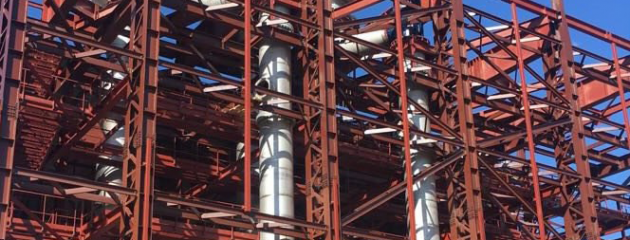
PRESS RELEASE: THE WORLD’S FIRST COMMERCIAL SCALE METHANE TO PROTEIN PLANT PUT INTO OPERATION USING THE NOVAL U-LOOP TECHNOLOGY FROM UNIBIO
Unibio and its partner and licensee Protelux are about to take a great leap forward producing alternative proteins from bacteria using methane as feedstock. During July Protelux completed the construction of the plant located in Russia and the parties are currently testing the plant and expect to commission it by late 2018.
In May 2016 Unibio signed a license agreement with the intent to upscale and commercialize the Unibio U-loop technology in Russia allowing the conversion of methane into protein. Russia was chosen as an ideal site for such product as bacterial protein is historically known in the Russian market, as Russia has a well-developed compound feed industry, and there is access to an abundance of cheap natural gas. Now, a little more than two years after dry ink on the contract, the first plant is ready for testing and commissioning.
Unibio CEO Henrik Busch-Larsen states: “It has been an exciting process working on this project, and it had been a very steep learning curve. I’ve been the CEO of Unibio for 6 years so naturally getting to the point where you see the fruit of the Unibio and Protelux teams’ labour in the shape of four huge U-shaped bio-reactors is quite satisfactory. Hard work is still in front of us in terms of getting the plant commissioned but this is a very important milestone in the Unibio go-to-market strategy.”
Next step 100,000+ tonnes per annum
This is just the beginning as the licensee has already reserved land for the future expansion. The land is situated in an industrial zone holding various international companies and where a lot of the necessary infrastructure is already present to support the project.
“We see this not just as a perspective investment into cutting-edge technology but as part of a bigger picture: a highly profitable industry of the local agricultural sector built from the ground up. The low cost of natural gas and electricity creates competitive advantages for Russia, when it comes to the production of bio protein*, we can expect this project’s EBITDA to be in the tens of percent. Our strategic goal is to secure its own source of locally sourced protein concentrate which is currently in very limited supply, for the Russian market,” says Protelux’ oversight board chairman Mikhail Serdtsev,
Facts about the Protelux plant:
- The plant has a production capacity of approx 6,000 TPA It is the first out of many plants to be constructed in the near future as the parties expect a rapid capacity increase to 100,000+ TPA
- The plant has four huge 30 meters high U-Loop bio-reactors
- The fermentation is a continuing process securing as little downtime as possible
About Unibio:
- Uniprotein® is produced based among other things on methane as feedstock in Unibio’s U-Loop® fermentor
- Unibio runs its research and pilot facilities at the Technical University of Denmark (DTU) and its demonstration-scale plant in Kalundborg, Denmark
- The technology has been developed in close cooperation with DTU
- The production plant in Kalundborg is co-financed by Innovation Fund Denmark, which sees great potential in industrial protein production
- The first full-scale production plant has been built in Russia by a licensee
- Uniprotein® holds 70% protein content and is produced without the use of pesticides, utilizes significantly less water than plant-based protein sources and does not take up farm land
- Uniprotein® has been approved in the EU for use in all animal and fish feed
- The production process always results in a uniform product, and the only waste product is clean water and limited CO2
*Generic term for Uniprotein/Single Cell Protein in Russia
For further information, please contact:
Group CEO Henrik Busch-Larsen
+45 6310 4040
E-mail: hbl@unibiogroup.com






